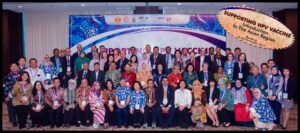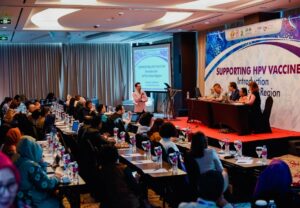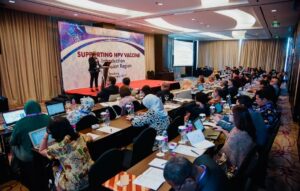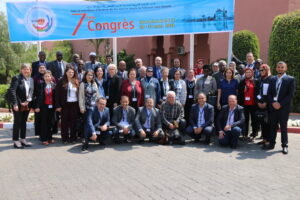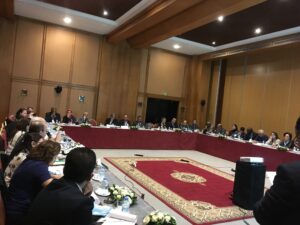In-service training 2019
Vaccinology Courses
15th Annual African Vaccinology Course, Cape Town, South Africa
The 15th Annual African Vaccinology Course was organised by the Vaccines for Africa Initiative (VACFA), University of Cape Town, from 4 to 8 November 2019 in Cape Town, South Africa.
The objectives of the course included:
- Provide participants with essential expertise to support national immunisation programmes
- Broaden the understanding of the challenges and opportunities in vaccinology at regional and global levels
- Build sustainable research capacity for vaccine development and conducting high quality vaccine trials in Africa
- Foster communication and networking among African vaccinologists
Following the vaccinology course, a closed session for NITAG members was organised, representing 5 African countries.
The course was attended by 61 participants from 21 African countries. Participants included national EPI managers, healthcare workers and basic scientists involved in vaccination programmes and/or vaccinology research in the African Region.
The course was facilitated by 39 faculty members (national and international), all experts in the field of vaccinology coming from academia, government, non-governmental institutions and industry. NESI was invited by VACFA to lecture on “Vaccination schedules: past, present and future”. NESI also participated in the closed NITAG session.
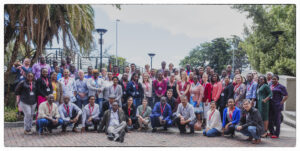
Erasmus+ Mundus Joint Master Degree "Leading International Vaccinology Education" (LIVE), Lyon, France
The Erasmus+ Mundus Joint Master Degree entitled “Leading International Vaccinology Education” (LIVE) was launched September 2016. LIVE is a two years Master’s programme between five European universities: Université Claude Bernard Lyon 1, France (coordinating university); Universtat Autonoma de Barcelona, Spain; Universitat de Barcelona, Spain; University of Antwerp, Belgium; Université Jean Monnet Saint-Etienne, France. The programme is supported by a worldwide network of 31 international associated partners and 16 supporting partners. NESI is supporting partner to the LIVE programme.
A total of 21 students are currently enrolled in the third LIVE promotion, called the “Lady Mary Montagu” Master LIVE Promotion 2018-20.
NESI was invited to give a lecture on 25 September 2019 at the Université Claude Bernard Lyon 1, during the third semester of the LIVE programme in the session on “Communication on vaccines and public health”. The lecture focused on “History and rationale of vaccination schedules; role of the NITAGs; and GVAP goals”.
From the second LIVE promotion, the “Louis Pasteur” Master LIVE Promotion 2017-19, one student completed his 6-months internship with NESI working on “Understanding the acceptability of vaccines and potential barriers to vaccination in general and specifically to HPV vaccines among university students in Indonesia ”.
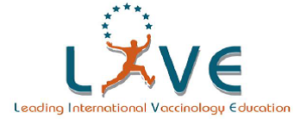
ECAVI Vaccinology Course, Kampala, Uganda
The vaccinology course for healthcare professionals was organised by the East Africa Centre for Vaccines and Immunization (ECAVI) from 17 to 21 June 2019 in Kampala, Uganda.
The aim of the vaccinology course was to equip healthcare professionals with up-to-date knowledge and skills on vaccines and immunisation in order to enable them deal with current and emerging challenges related to the immunisation programme.
The format of the course included: formal lectures; case studies; debate and discussion; practical demonstration sessions and presentations by participants.
Upon completion of the course, participants were able to:
- Understand the concept and principles of vaccination
- Describe how vaccines work
- Describe indications, contraindications, efficacy, and safety of vaccines according to WHO criteria
- Identify, manage and report Adverse Events Following Immunisation (AEFIs)
- Identify ways to improve communication with patients, parents and caregivers about vaccination
- Identify best practices for implementing or improving immunisation programmes
- Understand how to partner with other immunisation stakeholders
- Champion and advocate for uptake and promotion of immunisation
The course was attended by 68 participants from the following countries: Ethiopia (1), Kenya (21), Somalia (3), South Sudan (11), Sudan (2), Tanzania (9) and Uganda (21).
NESI was invited by ECAVI to chair 2 sessions and to give the following lectures: (1) Overview of vaccine-preventable diseases and their epidemiology; (2) Legal and ethical issues in vaccination; (3) Human Papillomavirus (HPV) vaccines; and (4) Vaccines in the pipeline.
NESI supported the participation of two EPI lecturers from Kenya Medical Training College (KMTC), as part of the on-going support to strengthen EPI training at KMTC.
MLM Courses
Mid-Level Management training, Freetown, Sierra Leone
WHO/AFRO in collaboration with the Ministry of Health of Sierra Leone, and supported by NESI, organised a Mid-Level Management training course in Freetown, Sierra Leone, from 26 February 2019 to 1 March 2019. This training was the second pilot of the newly reformatted MLM training modules, following the first pilot in Ghana in 2018.
The MLM training focused on 4 modules selected based on the national programme priorities in Sierra Leone: (1) Problem solving; (2) New vaccine introduction; (3) Supportive supervision; and (4) Surveillance.
A total of 34 participants from national and district level attended the course.
The aim of the workshop was:
- To be able to train trainers from various levels in Sierra Leone
- To be able to pilot the updated training tools, and identify issues in the training materials and methods that need to be addressed before finalising the course materials
Instructional design experts from Bull City Learning were present to assist with the design of the training and to assist with finalising the remaining modules, including the online versions. Minor adaptations following the piloting were incorporated in the final version of the revised MLM modules. A formal course evaluation was conducted and the new training format was well received by the participants.
Regional Mid-Level Management training for trainers, Addis Ababa, Ethiopia
WHO/AFRO in collaboration with the Ministry of Health of Ethiopia, and supported by NESI, organised a Regional Training of Trainers’ (ToT) workshop to introduce the updated Mid-Level Management training tools and to build capacity among WHO staff.
The revised modules were piloted in Ghana during 2018 and in Sierra Leone during 2019. The modules are currently available in English and are being translated in French.
The objectives of the ToT included:
- To introduce the new MLM modules
- To train a critical number of resource persons in order to enable them to serve as facilitators in future MLM courses
The modules covered during this ToT included: (1) Planning immunisation activities; (2) Communication; (3) Organising and implementing Supplementary Immunisation Activities; (4) New vaccines introduction; (5) Vaccine management; and (6) Monitoring EPI.
In addition, a session on Adaptive Leadership was organised by the Sabin Vaccine Institute.
A total of 34 participants from 14 countries participated in the ToT workshop. Facilitators (8) were from WHO regional and inter-country support team offices and NESI. Instructional design experts from Bull City Learning were present to assist with the facilitation of the training and guide on good facilitation skills.
The outcomes of the ToT training included:
- A pool of potential trainers developed at regional, sub-regional and country levels who can run the MLM course in countries as per country request
- Potential trainers completed at least 6 workshop modules and two online modules
- Potential trainers received training on facilitation skills
The workshop concluded with a list of 20 tips for becoming a MLM master trainer.
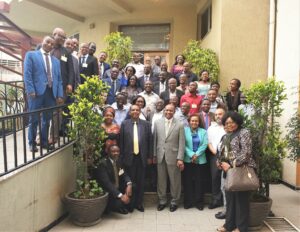
Workshops supporting NITAGs
Supporting HPV vaccine introduction in the Asian Region, Bandung, Indonesia
NESI in collaboration with Universitas Padjadjaran (UNPAD) and the Indonesian Pediatric Society (IPS) organised a workshop on “Supporting HPV vaccine Introduction in the Asian Region” from 18 to 20 November 2019 in Bandung, Indonesia. The workshop received support from the Ministry of Health Indonesia.
The workshop explored the current status of HPV vaccine introduction in the SEARO and WPRO Region, gaps in information about HPV diseases burden, optimal communication and delivery strategies for the introduction of HPV vaccine and the role of NITAGs in decision making process for the introduction of new vaccines. The workshop comprised of interactive presentations, round table discussions, country presentations, including sharing of experiences and best practices.
The key target groups included representatives of: Expanded Programme on Immunisation, National Immunisation Technical Advisory Groups (NITAGs), Adolescent Health Programme, Non-communicable Disease Programme, School Health Programme, National and International immunisation partners and other stakeholders.
The objectives of the workshop included:
- To discuss the burden of HPV related diseases, especially cervical cancer, in the SEARO and WPRO Region.
- To discuss the available HPV vaccines and their use in national immunisation programme.
- To discuss potential adolescent health interventions to be delivered alongside HPV vaccination.
- To discuss optimal communication strategies for the introduction of HPV vaccination.
- To exchange lessons learnt and best practices regarding HPV vaccine introduction among participating countries.
- To strengthen national teams of experts in the participating countries to make evidence-based recommendations and decisions to support and advocate for the introduction of HPV vaccination.
- To strengthen the international community to further stimulate discussion and research on cervical cancer, HPV vaccination and adolescent health.
The workshop was attended by 84 delegates, including participants, facilitators and observers. Nominated delegates were from the Ministry of Health and NITAG members from Afghanistan, Australia, Bangladesh, Bhutan, Cambodia, India, Indonesia, Lao DPR, Malaysia, Maldives, Myanmar, Nepal, Papua New Guinea, Sri Lanka, Thailand and Vietnam. Other participants came from Academia, Research Institutes/Centers, National and International Organisations and industry. Facilitators were from: UNPAD, IPS, Indonesian Society of Gynaecologic Oncology (INASGO), MoH Indonesia, NITAG Indonesia, WHO/Indonesia, WHO/WPRO, NESI/University of Antwerp, IARC/WHO, WHO/India, MoH Oman, NITAG Australia and University of Pretoria, South Africa.
Presentations highlighted key aspects on burden of cancer caused by HPV, cervical cancer screening, update on HPV vaccine and cost effectiveness, delivery strategy for HPV vaccination, role of advocacy communication and social mobilization for building public trust in HPV vaccination and monitoring as well as evaluation of HPV vaccination programme. In addition, the role of NITAGs in decision making process for HPV vaccine introduction was also emphasized. Experiences of HPV vaccine introduction from the regions were shared by the delegates from Australia, Malaysia, Bhutan, Maldives and Sri Lanka. Moreover, participants from all the participating countries shared the status of HPV vaccination program in the respective countries along with potential challenges and opportunities for the national introduction of the HPV vaccine.
The round table discussion explored on how to overcome hurdles for HPV vaccine introduction and cervical cancer screening, focusing on socio-economic and cultural challenges. The countries who had already introduced the HPV vaccination programme successfully in the region shared their experiences and lesson learnt which was followed by interactive plenary discussion.
All the presentations and background documents were shared with the participants through password protected link. The workshop as well as the topics covered were highly appreciated by all the delegates. The participants requested for an annual meeting to update them about the recent recommendations and support the decision making about HPV vaccine introduction.
Renforcement des capacités de l'introduction du vaccin contre la varicelle dans...
The workshop “Renforcement des capacités de l’introduction du vaccin contre la varicelle dans les programmes nationaux de vaccination”, was organised on 29 March 2019 in Marrakech, Morocco, by the University Cadi Ayyad, SOMIPEV, and NESI/University of Antwerp.
The workshop explored the current status of varicella vaccine introduction in participating countries, gaps in information about varicella disease burden, and the role of NITAGs in new vaccine introduction.
The objectives of the workshop included:
- To increase knowledge on vaccine-preventable diseases, focusing on varicella
- Raise the awareness about varicella disease burden in certain risk groups
- To create awareness regarding varicella vaccination in the participating countries in order to reduce morbidity and mortality
- To support the national team of experts to make evidence-based recommendations on varicella vaccine introduction
The workshop consisted of interactive presentations and a round table discussion, including sharing of experiences and best practices.
The key target group included representatives of: Expanded Programme on Immunisation; National Immunisation Technical Advisory Groups (NITAGs); immunisation partners; and other relevant stakeholders.
The workshop was attended by 44 participants. NITAG members and MoH representatives of the following countries participated in the workshop: Algeria, Benin, Cote d’Ivoire, Mali, Morocco, Mauritania, Niger, Tunisia and Senegal. Facilitators of the workshop were from Cadi Ayyad University, SOMIPEV and NESI/University of Antwerp.
The workshop discussed the epidemiology and burden of varicella disease in the Region. An update of the varicella vaccines was presented, as well as the experience of varicella vaccination in the European Region.
The round table discussion addressed the following issues: decision-making process; need for operational research and support from partners.
Development of Training Materials
Revision of Mid-Level Management training modules
National immunisation systems are constantly undergoing changes, including the introduction of new vaccines and technologies, and programme expansion to reach broader target populations beyond infants and children. In addition, the EPI programme faces external changes related to administrative decentralization, health reforms, among others. EPI programmes operate within the context of the national health systems, in alignment with global and regional strategies.
To address these changes and to ensure the smooth implementation of immunisation programmes, EPI managers and staff require skills in problem solving, priority setting, decision-making, planning and managing human, financial and material resources as well as monitoring the implementation, supervision and evaluation of services. Building national capacity in immunisation service management at all levels of the health system is therefore essential to achieve the goals of the global and regional strategic plans.
Standardised training modules for Mid-Level Managers have been developed first in 2004 by WHO/AFRO in collaboration with partners. These modules have facilitated the learning process during various inter-country and national Mid-Level Management (MLM) courses.
In view of the above mentioned current changes, WHO/AFRO in collaboration with key immunisation partners, like UNICEF and NESI/University of Antwerp have revised the EPI MLM training modules. This was done with the support of Bull City Learning, an organisation specialised in instructional design. In addition, the training was reformatted to have a mix of classroom and self-paced online training. All modules are available in English. Translation to French is on-going.

